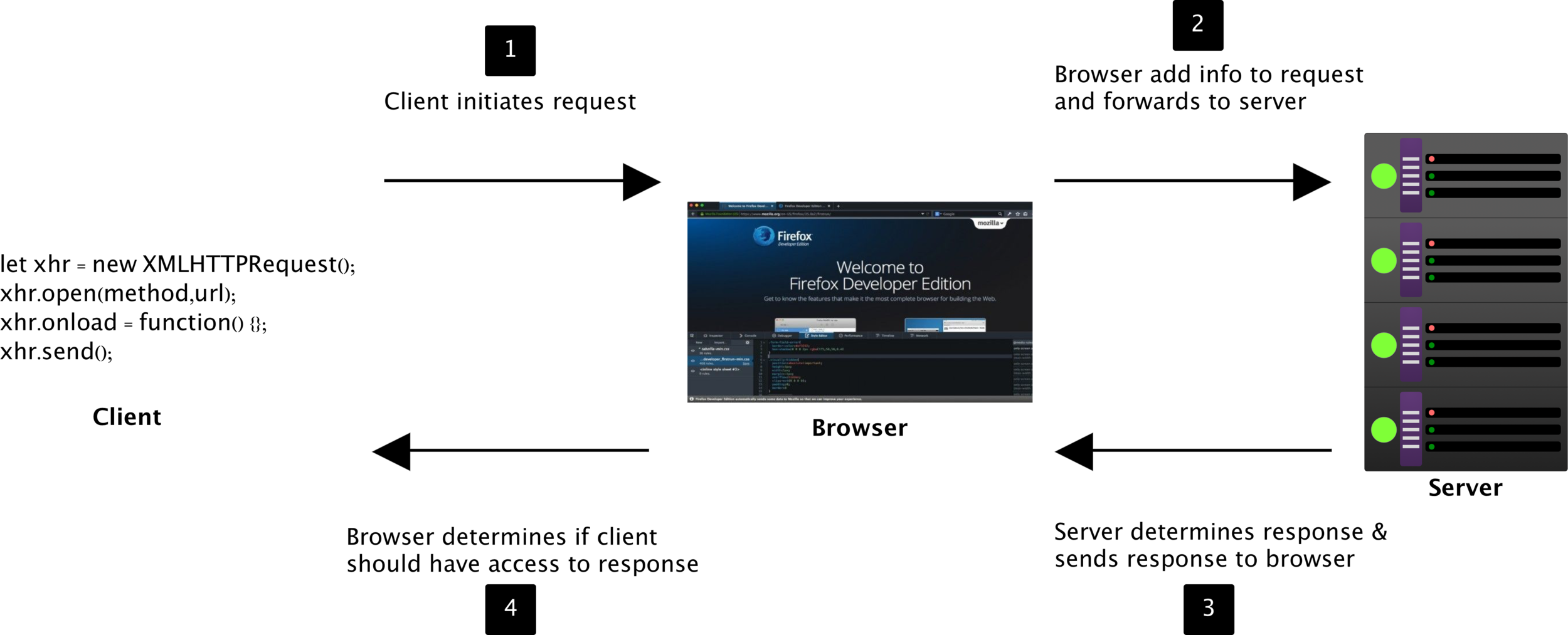CORS
Cross-Origin Resource Sharing
GOAL
- What & Why & How
- ClientSide
- ServerSide
- see it in action
to learn
pre-Game
- around 2004
- browser configuration
what was the first browser to support?
Chrome 4.0
- cons
- browser spec
- server configuration*
- pros
- users first
*preflight
What does it do?
- Enables clients to make requests to servers hosted on different origins
- Client & server side component
- client controls how CORS request are made
- server controls which type of CORS requests are allowed (opt-in)
Why do we need it?
- We are building clientSide applications that live on different origins but need resources from another origin to function
- 'Security'
- CORS by itself is NOT security
- CORS is a very small part in securing your services
How does CORS work?
client = browser = server
- Browsers have a Same-Origin Policy
- contradiction?
- Servers in control of who & what
How does CORS work?
lifecycle

How does CORS work?
- Origin request header
- where client resource lives
- no Origin header, no CORS
- scheme, host, port of URL
- browser sets the Origin header
- Access-Control-Allow-Origin (ACAO) response header
- server response
- no ACAO, no CORS
- wildcard || Origin value
MUST
How does CORS work?
Preflight Requests (asking for permission)

How does CORS work?
Preflight Requests (asking for permission)
- preserve backward compatibility
- existing servers have no idea
- is it ok to send request?
How NOT to trigger a preflight
- GET
- <img />, <script />
- POST
- <form />
- application/x-www-form-urlencoded, multipart/form-data, or text/plain
How does CORS work?
Preflight Requests (asking for permission)
Triggering preflight
- Method other than GET, POST, or HEAD
- Content-Type request header with values other than
- application/x-www-form-urlencoded b multipart/form-data
- text/plain
- Additional request headers that are not
- Accept
- Accept-Language
- Content-Language
XMLHttpRequest
onloadstart
onprogress
onabort
onerror
onload
ontimeout
onloadend
onreadystatechangeEvents Handlers
Response Properties
status
statusText
response
responseText
responseXMLCache-Control
Content-Language
Content-Type
Expires
Last-Modified
PragmaCan only read these Headers*:
*unless server explicitly states otherwise
Cookies are not sent by default*
withCredentials = true;
user credentials such as cookies,
basic authentication information, or
Secure Sockets Layer (SSL) certificates*server must allow cookies
Client Side
XMLHttpRequest
Client Side
fetch('http://localhost:4000/status').then(function(response) {
return response.json();
}).then(function(stuff) {
console.log(stuff);
});GET
fetch('http://localhost:4000/posts').then(function(response) {
return response.json();
}).then(function(stuff) {
console.log(stuff);
});GET
XMLHttpRequest
Client Side
var msg = 'This is another blog post';
fetch('http://localhost:4000/posts', {
method: 'post',
mode: 'cors',
body: JSON.stringify({
6: msg
})
}).then(function(response) {
return response.json();
}).then(function(stuff) {
console.log(stuff);
});POST
fetch('http://localhost:4000/posts/2', {
method: 'delete'
}).then(function(response) {
console.log('cool');
})DELETE
Server Side
const whitelist = [
config.rootUrl,
config.ereaderUrl,
config.ereaderUrlDev,
config.ereaderUrlTest,
config.cors.bfwpub,
config.cors.macmillanHighered,
config.cors.macmillanTech,
config.cors.rls
];
const isPreflight = function(req) {
const isHttpOptions = req.method === 'OPTIONS';
const hasOriginHeader = req.headers['origin'];
const hasRequestMethod = req.headers['access-control-request-method'];
return isHttpOptions && hasOriginHeader && hasRequestMethod;
};
const passThrough = ['GET', 'HEAD'];
const allowOnly = ['POST', 'PUT'];
function allowOrigin(ctx) {
const { reqId, request } = ctx;
if (isPreflight(request)) {
const hasRequestMethod = request.headers['access-control-request-method'];
if (!allowOnly.includes(hasRequestMethod)) {
return;
}
}
if (request && request.method && passThrough.includes(request.method)) {
return '*';
}
if (request && request.header && request.header.origin &&
!whitelist.includes(request.header.origin) && !request.header.origin.match(/\.mldev.cloud/)) {
logger.error('CORS -- invalid origin', { reqId, origin: request.header.origin });
ctx.status = 400;
return;
}
return request.header.origin || '*';